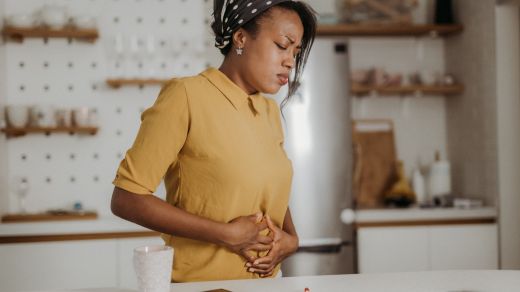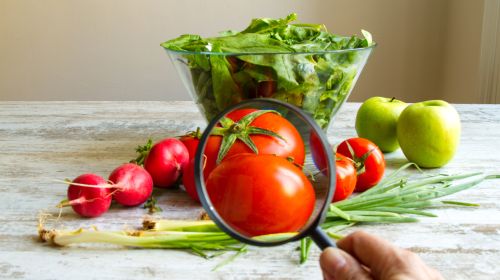Food poisoning is a gastrointestinal illness resulting from ingestion of toxic, unclean, or bacterially contaminated food. Typical symptoms are nausea, vomiting and diarrhea. How long the symptoms usually last and what you can do!
- © Getty Images/milan2099
Quick Reference: Food Poisoning
Definition: Food poisoning is a gastrointestinal illness caused by ingesting food contaminated with germs.
Causes: Food poisoning can be caused by bacteria, toxins, parasites or viruses.
Symptoms: Typical are abdominal cramps, nausea, vomiting and diarrhea a few hours after eating the contaminated food.
Diagnosis: In most cases, the description of the symptoms and the previously consumed meals are sufficient for the diagnosis. In severe cases, blood, stool, and/or vomit are tested.
Treatment: Food poisoning usually clears up on its own within a few days. During this time you should drink a lot and eat lightly.
Article content at a glance:
What is food poisoning?
Food poisoning is caused by toxins entering the body through food. This is basically possible in two ways:
The toxins enter the organism directly through the food consumed – this is the case, for example, with moldy or expired food.
When eating, pathogens such as staphylococci or coliform bacteria are transported into the body.
Food poisoning, for example from moldy or spoiled food, is not contagious. The situation is different if the symptoms are caused by bacteria, viruses or parasites (food infection).
In particular, if there is a lack of hygiene, pathogens can be transmitted from person to person. Colloquially, foodborne infection and food poisoning are mostly used interchangeably.
Frequency of foodborne infections
Food infections are common. However, they are often not recorded because the symptoms usually subside on their own within a few days and without a visit to a doctor’s office.
However, some of the pathogens are notifiable. In 2021, the Robert Koch Institute registered 1,179 foodborne disease outbreaks in Germany.
Typical symptoms of food poisoning
Depending on the trigger and the general condition of those affected, food poisoning manifests itself through different symptoms. The following symptoms almost always occur:
- nausea
- Vomit
- Stomach cramps
- Diarrhea
In some cases, other symptoms such as headaches, chills, fever, poor circulation, tiredness, joint and muscle pain are also present.
Duration and incubation period of food poisoning
Symptoms usually appear within a few minutes to hours after eating the spoiled or contaminated food. In rare cases, the incubation period is several days.
Symptoms usually go away on their own after a few days. If the symptoms persist for several days or if there is blood in the stool or vomit, you should definitely consult a doctor.
Special case: foodborne botulism
A special case is food poisoning, which is caused by the bacterium of the type Clostridium botulinum is caused. This bacterium produces a neurotoxin also known as botulinum toxin.
Foodborne botulism is rare but can lead to serious health problems: Paralysis occurs 20 to 36 hours after eating contaminated food, starting with the eye muscles. In this case, immediate treatment in the hospital is required. In the further course, the respiratory muscles can also be affected and lead to a life-threatening respiratory arrest.
Food poisoning: causes and risk factors
The most common causes of foodborne illness are improper food storage, cleaning, or preparation. If cold chains are broken, storage times are exceeded, hygiene measures are not observed or food is not heated long enough, it can become contaminated or spoil.
Possible causes of food poisoning are:
Food poisoning occurs more frequently in summer or in southern holiday countries in particular, because the pathogens multiply faster at high temperatures. There is an increased risk of undercooked meat, fish and seafood.
Likewise, the consumption of spoiled mushrooms such as button mushrooms or porcini mushrooms can lead to gastrointestinal problems. Experts also speak of fake mushroom poisoning.
Diagnosis: How to diagnose food poisoning
In a detailed conversation (anamnesis), the diagnosis of food poisoning can often be made based on the typical symptoms and the description of recently eaten meals.
In the case of severe courses, samples of blood, stool and vomit are also taken and examined in the laboratory for the causative pathogen. If there is a suspicion of an infection with Clostridial, the therapy is initiated before the laboratory results are received in order not to lose time.
Food poisoning caused by bacteria is notifiable in Germany. The food suspected to be the cause is examined by specialized institutes and, if necessary, a food warning is issued in order to avoid further cases of food poisoning.
Therapy: How is food poisoning treated?
In most cases, food poisoning does not require medical attention. The following home remedies can help in this case:
Drink a lot to compensate for the loss of liquid (water, tea, still apple juice, broth, if necessary electrolyte solution from the pharmacy)
Switch to bland food (with rusks, bananas, rice and white bread)
Avoid heavy, acidic and mucous membrane-irritating foods and drinks (such as fruit juices, raw vegetables, dairy products, coffee, alcohol, greasy meals).
Under no circumstances should drugs against diarrhea be taken, as they delay the excretion of the pathogen. Treatment with antibiotics is only used for pathogens such as certain salmonella or in severe cases after an infection with Campylobacter or Yersinia. Botulism requires immediate medical attention and administration of an antidote can be life-saving.
Course and prognosis of food poisoning
Food poisoning usually heals quickly without any consequences. Only in elderly or chronically ill people, pregnant women, infants and small children does a severe course occur in rare cases, which makes hospitalization necessary.
Prevention: how to prevent food poisoning
Above all, good hand and kitchen hygiene and uninterrupted cold chains contribute to the avoidance of food poisoning. To prevent food contamination or spoilage:
only buy food in undamaged packaging
Always transport perishable food in a cool bag
Store raw animal products separately from fresh produce in the refrigerator
Observe the best before date of food
Wash hands thoroughly before preparing food and remove hand jewelry
Wash fruits, lettuce and vegetables with drinking water
Cook fish and meat dishes well
Clean dishcloths and cleaning rags thoroughly and replace them regularly
Always cover food for storage
Keep insects, rodents and other animals away from food
Heat leftovers sufficiently before consumption
Bloated packaging or high-arched lids on canned goods can indicate contamination with Clostridium botulinum Clues. The food contained in it should therefore not be used under any circumstances.


